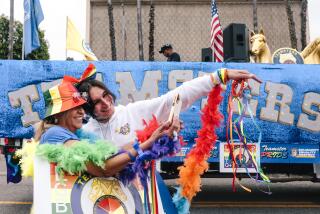Pressure Against Hollywood Strike Grows
- Share via
The chief Teamsters Union official in Hollywood suggested Monday that his members will continue working if the Writers Guild of America strikes, a development that brings new pressure on television and film writers to settle their contract dispute with the studios.
“If it comes down to it, my members come first,” said Leo Reed, head of Teamsters Local 399 in North Hollywood, in an interview. “We usually honor other locals’ picket lines. But if there is a writers strike and there is work to be done, I’ll support my members.”
The comments, which come as the Writers Guild and studio representatives resume talks today, are the most blunt yet from a union official in Hollywood about what his members might do should writers walk out.
They come against a backdrop of other developments that could encourage the parties to settle their differences before the current contract expires May 2.
Among those developments in recent weeks:
* Concerns have been raised about a strike at a time when the economy is softening and the entertainment industry is experiencing layoffs.
* Efforts are underway by other Hollywood unions to avert a work stoppage by writers and the Screen Actors Guild, whose contract expires July 1.
* And Los Angeles Mayor Richard Riordan has announced a public relations campaign to avert the strikes.
Many obstacles to an accord remain. Nevertheless, the recent developments have exposed a glimmer of optimism that didn’t exist March 1, when talks broke off after six weeks.
“The probability of us settling this thing is better than 50%. We have smart people on both sides, and we both have an incentive to fix this,” said Charles Holland, co-chairman of the Writers Guild’s negotiating committee.
J. Nicholas Counter, who as head of the Alliance of Motion Picture and Television Producers is the lead negotiator for the studios and networks, declined to comment.
But the head of one major media company, who said he had always been “the most pessimistic” among his Hollywood counterparts, acknowledged privately last week that he was feeling “surprisingly optimistic” that the new round of talks would end well. “I think the economy is having an effect, and the two sides haven’t been throwing the usual barbs back and forth at each other,” he said.
The Teamsters local represents nearly 4,000 workers in Hollywood who drive trucks and work as dispatchers, location managers, animal trainers and other service jobs that cater largely to motion picture and television production. It is a blue-collar union that has had an at-times uneasy relationship with the more white-collar actors and writers guilds.
Asked about Reed’s statement, a WGA official declined to comment, saying it is premature to discuss a strike.
“We’re focused on completing this round of talks with a contract that can be recommended to our members,” said Cheryl Rhoden, the guild’s assistant executive director.
Officials with the International Alliance of Theatrical Stage Employees have warned publicly about the effect of a strike on members, with many working quietly behind the scenes to try to bring the two sides together. Also working in the background has been the Directors Guild of America.
Whether the writers and studios can reach an agreement by the time the current contract expires is a question because the two sides remain far apart, chiefly on financial aspects of the deal.
The chief stumbling blocks are residuals writers get when their work is rerun on cable TV and in foreign markets, and payments they get from video and DVD sales. Studios insist writers want a package worth $227 million over three years, while writers say the number is closer to $100 million.
The search for a settlement reached court side last week at Staples Center, where two of the negotiating adversaries, DreamWorks SKG partner Jeffrey Katzenberg and John Wells, president of the Writers Guild’s West Coast faction, were seen sharing floor seats as the Lakers beat the Minnesota Timberwolves on Thursday.
“I went over to them and said, ‘Close the deal,’ ” said Jeff Berg, chairman of International Creative Management, one of Hollywood’s top talent agencies.
Another top studio executive close to the negotiations, who did not want to be identified because of the sensitivity of the talks, said another good sign came last week when representatives from both sides jump-started the kind of informal, back-channel discussions that often help pave the way for a deal.
It’s unclear how much direct effect it would have on a writers strike if the Teamsters continue working, because the main pressure writers would bring on studios is cutting off the supply of scripts needed to produce TV episodes.
Writers probably would seek support from all other entertainment unions in the event of a strike, and any suggestion that support won’t be unanimous probably would hurt a strike effort.
Reed’s comments underscore the historical tensions between the writers and actors in Hollywood’s labor guilds on one side and its union members who drive trucks, build sets and perform myriad jobs that are at jeopardy if a walkout occurs.
Hollywood’s blue-collar workers often complain that actors and writers have failed to support them during their strikes.
Reed singled out writers for a lack of support during the last Teamsters strike in Hollywood in 1988.
And the last time the Screen Actors Guild struck studios in 1980, Teamsters were so angry they blocked actors from a guild rally at the Hollywood Bowl by parking their rigs in front of the entrances.
Last year, the Teamsters supported the six-month strike against advertisers by the Screen Actors Guild and the American Federation of Television and Radio Artists.
But Reed complains that it cost his local “100 jobs a day.” The president of the International Alliance of Theatrical Stage Employees, Thomas Short, has estimated that the strike by commercial actors cost his members 1 million hours of work.
Reed, who said he personally walked SAG’s picket line last year, said “a SAG strike would cost us over 3,000 jobs” because the majority of the Teamsters’ 3,900 members work in film and TV production.
Many in Hollywood believe the parties could wind up pushing back the deadline in hopes of buying more time to reach a three-year deal.
The biggest fear is that a strike by writers will lead to a strike by actors. If that happens, production of films and TV shows would stop.
“There would be no need to honor or cross the picket line because there would be no work,” Reed said.
More to Read
Inside the business of entertainment
The Wide Shot brings you news, analysis and insights on everything from streaming wars to production — and what it all means for the future.
You may occasionally receive promotional content from the Los Angeles Times.










